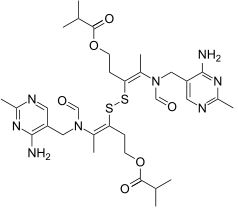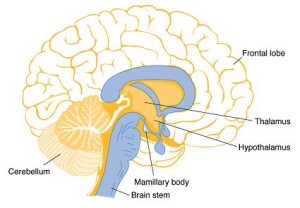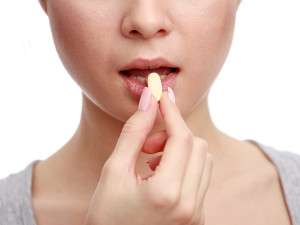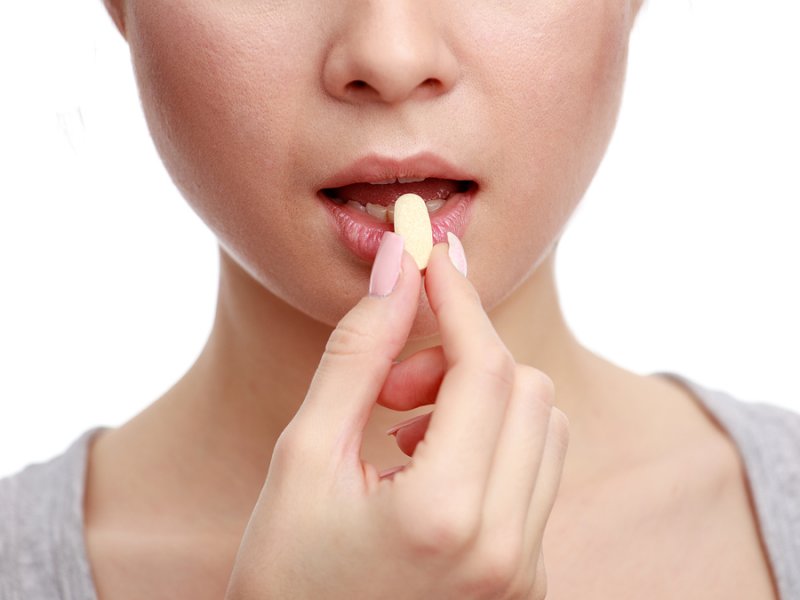Table of Contents
Sulbutiamine (isobutyryl thiamine disulfide) is a synthetic derivative of Vitamin B1 (thiamine). Thiamine was the first B Vitamin to be discovered by researchers. That’s why it’s called B1.
Sulbutiamine is simply two vitamin B1 molecules joined together. This chemical bond helps thiamine more easily cross the blood-brain barrier.
Japanese scientists first synthesized Sulbutiamine in an attempt to quell a health crisis within the Japanese population. After WWII, the Japanese diet largely consisted of rice. This left them deficient in several key nutrients including thiamine.
Insufficient thiamine led to a central nervous system disorder called Beriberi. But supplementing with thiamine alone didn’t help. Because of its poor bioavailability. And a lot of thiamine was needed to cure Beriberi symptoms.
Sulbutiamine is far more bioavailable than standard thiamine. It is fat-soluble (thiamine is water-soluble) which helps it more easily cross the blood-brain barrier.
The discovery of Sulbutiamine cured the Japanese population of a life-threatening disease. And it has since been tested and used throughout the world with much success.
Throughout this article I’ll refer to Sulbutiamine interchangeably with thiamine. Sulbutiamine is the stronger of the two so it’s affects are amplified compared to standard thiamine.
Thiamine is a coenzyme used by your body to metabolize food for energy. And to maintain proper heart, nerve and brain function.
Thiamine also helps digest and extract energy from food. It turns nutrients into adenosine triphosphate (ATP). ATP is the fuel created by your cell’s mitochondria.
And thiamine helps convert carbohydrates into glucose. The energy your body uses for your brain and nervous system.
One more thing about this miracle B-vitamin. Thiamine contributes to the development of myelin sheaths which wrap around axons to protect them from damage.
Sulbutiamine helps:
- Brain Optimization: Thiamine is critical for increasing focus, energy, and preventing memory loss. And can ward off inflammation. Healthy brain function is crucial for good decision making.
- Neurotransmitters: Thiamine is essential for producing the neurotransmitter acetylcholine (ACh). ACh is used to relay messages between neurons in your brain. And is critical for cognition, learning and memory.
- Mood: Thiamine helps your body withstand stress. A lack of energy can contribute to poor mood and motivation. Thiamine can boost your mood, and defend against depression and anxiety.
What is Sulbutiamine? (thiamine derivatives)
Sulbutiamine is a synthetic version of Vitamin B1 (Thiamine). Japanese researchers synthesized Sulbutiamine by bonding two B1 molecules.

They developed Sulbutiamine in response to a country-wide health crisis. The Japanese population were severely thiamine-deficient from a rice-only diet. Large numbers of the population were suffering from Beriberi. A central nervous system disorder caused by a lack of thiamine.
Your body does not produce thiamine on its own. So you must get it from food including beef, brewer’s yeast, legumes (beans, lentils), milk, nuts, oats, oranges, pork, rice, seeds, wheat, whole-grain cereals, and yeast.
But thiamine has poor bioavailability. By synthesizing thiamine and producing Sulbutiamine you end up with a fat-soluble compound that is easily digested. And readily crosses the blood-brain barrier.
Sulbutiamine vs. Thiamine: What’s the Difference?
Sulbutiamine is a synthetic version of Vitamin B1 (Thiamine). It is two B1 molecules chemically bonded together.
Thiamine is water-soluble and does not easily cross the blood-brain barrier. Sulbutiamine is a fat-soluble compound that easily crosses the blood-brain barrier.
Sulbutiamine functions in the body just like thiamine. But because it’s more bioavailable it’s more effective than thiamine.
How does Sulbutiamine Work in the Brain?
Sulbutiamine boosts brain health and function in several ways. But two in particular stand out.
- Sulbutiamine is a fat-soluble molecule that crosses the blood-brain barrier more readily than thiamine. Once in your brain, it increases levels of thiamine pyrophosphate (TPP).
Thiamine pyrophosphate (TPP) is directly involved in the citric acid cycle in the brain.
This cycle breaks fatty acids, amino acids and monosaccharides into smaller molecules that produce adenosine triphosphate (ATP) energy within your mitochondria. And provide the building blocks of the molecules needed to produce brain cells.

A deficiency of TPP can eventually show up as Wernicke encephalopathy and Korsakoff syndrome. In our society this syndrome is typically caused by chronic alcoholism. But it can also occur after obesity (bariatric) surgery, Crohn’s disease, anorexia and if you’re on kidney dialysis.
Symptoms of Wernicke-Korsakoff syndrome include confusion, inability to form memories, loss of memories and muscle coordination, confabulation (making up stories) and vision changes. And can ultimately (and very rapidly) lead to coma and death.[i]
Less severe cases of thiamine deficiency include fatigue, weight loss, irritability and confusion.
- Sulbutiamine also contributes to the production of the enzyme PDH which is essential in making the neurotransmitter acetylcholine. And for the synthesis of myelin, which forms a sheath around the axons attached to neurons. Ensuring these neurons can conduct signals.[ii]
The citric acid cycle and enzyme α–KGDH play a role in maintaining optimal levels of the neurotransmitters glutamate, and gamma–aminobutyric acid (GABA).
When thiamine levels decrease, the activity of these enzymes are reduced.[iii]
How things go bad
We depend on our diet for thiamine. Very little thiamine is stored in your body. And depletion can occur within 14 days.
Thiamine deficiency can be caused by alcoholism, Alzheimer’s Disease, anemia, athletes who reduce food intake, cancer, clogged arteries, Crohn’s disease, diabetes, diarrhea and kidney disease. And even a poor diet.
↓ Low thiamine levels can slow creation of ATP
↓ Low thiamine levels can cause problems with memory, learning, recall and perception
↓ Acetylcholine levels decline
All of these changes can happen at any age. And are a product of the food we eat, what we drink, lifestyle habits, the air we breathe and more.
So Sulbutiamine can help age-related cognitive decline, as well as a student looking to do better in school. By boosting acetylcholine, dopamine and GABA in the brain. And increased brain energy by creating ATP within mitochondria. And building myelin sheaths that protect our axons.
Sulbutiamine benefits
Sulbutiamine is directly involved in the citric acid cycle that provides adenosine triphosphate (ATP) energy created within your mitochondria.
Sulbutiamine also plays a role in maintaining optimal levels of the neurotransmitters glutamate, and gamma–aminobutyric acid (GABA). And contributes to the production of the enzyme PDH which is essential in making the neurotransmitter acetylcholine.
Sulbutiamine will boost cognition, memory and decision-making. And has very effective anxiolytic (anti-depressant) qualities.
How does Sulbutiamine feel?
Sulbutiamine is a fat-soluble form of thiamine which crosses the blood-brain barrier. It has been shown to improve glutamatergic, cholinergic, and dopaminergic neurological transmissions. It may also increase the density of D1 dopamine receptors.[iv]
Nootropics users report:
- Sulbutiamine as a study aid. On its own, Sulbutiamine seems to increase attention span for many neurohackers. And when combined with caffeine or any one of the racetams, many report being able to work effortlessly for hours on end. Study and work seems less stressful.
- Boost motivation. Sulbutiamine boosts motivation and many report gives them the drive they need for study or work.
- Increased focus. Sulbutiamine helps provide laser-like focus at work and school. Some report even with the most tedious of tasks. While staying in a very good mood.
- Sociability. Many users report being able to articulate thoughts, and improved speaking ability. Language and your vocabulary seem to flow effortlessly. Thoughts and ideas come with less effort.
- Improved mood. Personally, I’ve found Sulbutiamine to be more effective than any prescription antidepressant I’ve ever tried. And without the side effects.
You should be able to experience the effects of Sulbutiamine soon after you take it.
Sulbutiamine Clinical Research (thiamine deficiency)
Sulbutiamine Improves Mood
A study at the University of Wales Swansea in the UK worked with 120 young adult females. Study participants took either a placebo or 50 mg thiamine for 2 months. Mood, memory and reaction times were monitored before and after taking the tablets.
The results indicate that after 2 months of thiamine supplementation, the young females:
- Were more clear headed
- Felt more composed and energetic
- Reaction times improved
- Improved mood.[v]
Sulbutiamine for Chronic Fatigue
If you deal with chronic fatigue, Sulbutiamine may be a better option than another cup of coffee. Or a stimulant.
Researchers at the Hospital Saint-Antoine in Paris studied 326 patients. All suffering from chronic fatigue. Patients were given 400 mg or 600 mg of Sulbutiamine daily. Or a placebo in this double-blind, parallel-group study.
Patients were tested on the 7th and 28th days of the trial. Those that used 600 mg of Sulbutiamine had less fatigue.[vi]
Sulbutiamine Improves Memory
Poor memory is associated with low levels of choline activity in the brain. Choline is a precursor to the neurotransmitter acetylcholine (ACh). ACh transmission between neurons helps in memory formation.
Scientists decided to find out if Sulbutiamine could help boost choline uptake. They gave a group of mice Sulbutiamine for 10 days, and then tested their memory. The findings suggested Sulbutiamine improved memory formation. And it was due to an increase in choline activity in the brain.[vii]
Another study in France involved giving Sulbutiamine or a saline solution to rats for 9 weeks. The results of this study concluded Sulbutiamine provided better working and episodic memory.[viii]
Sulbutiamine Improves Athletic Performance
Many neurohackers use Sulbutiamine for a boost in physical energy. And it’s created some controversy in professional sports.
The Moscow Anti-Doping Center analyzed 16,000 blood samples in a Russian lab in 2009. They were looking for anabolic steroids in athletes.
They found that 100 samples contained Sulbutiamine. These samples were collected in-competition. Indicating that Sulbutiamine was intentionally administered for its “ergogenic and mild stimulating properties”.[ix]
Sulbutiamine Improves Erectile Dysfunction
One small study was conducted with 20 patients suffering from psychogenic erectile dysfunction. This type of ED is defined as the inability to achieve or maintain an erection because of psychological factors.
The men were given a prescription form of Sulbutiamine ‘Enerion’ for 30-days. 16 of the men showed significant improvement based on the international index of erectile function (IIEF).
3 of 6 men with arterial disorders in their penis showed that Sulbutiamine corrected the problem. The study concluded that erectile dysfunction can be effectively treated with Sulbutiamine.[x]
Sulbutiamine Dosage
Recommended Sulbutiamine dosage is 400 mg to 1,000 mg per day. Higher doses should be split with one dose in the morning, and the other early afternoon.
 Some neurohackers warn about dosing Sulbutiamine too late in the day. It’s mild ‘stimulant’ qualities could interfere with sleep.
Some neurohackers warn about dosing Sulbutiamine too late in the day. It’s mild ‘stimulant’ qualities could interfere with sleep.
If you’re just starting out with Sulbutiamine, I suggest starting with a low dose and see how your body reacts.
Tolerance can be a problem with Sulbutiamine. So when taking it for extended periods, you may find it beneficial to cycle on and off the supplement. For example, take Sulbutiamine for 5 days, and take 2 days off before your next dose.
Sulbutiamine powder tastes nasty. So you’d be advised to take it in capsule form. You can save on the cost of Sulbutiamine by making your own capsules.
And Sulbutiamine is fat-soluble so take it with a tablespoon of unrefined coconut or olive oil for better absorption.
Sulbutiamine Side Effects
Sulbutiamine is non-toxic. So is considered well-tolerated and safe.
Side effects are rare but can include skin rashes and eczema-like outbreaks at higher doses.
Sulbutiamine can also create mood swings. Particularly if you’re bipolar or are taking bipolar medication.
If you take Sulbutiamine late in the day you may find it interferes with sleep. Some find it has mild stimulant effects.
There are some reports that Sulbutiamine can be addictive. If you have addiction-like tendencies, you may want to be cautious about using this supplement. It does affect dopamine levels in the brain.
Where to buy Sulbutiamine
Sulbutiamine is sold in tablet, capsule and powder form. Tablets and capsules are usually 750 mg each.
It’s sold as a prescription medication in some countries under the brand names Arcalion, Enerion, Bisibuthiamine, and Youvitan.
In Dec. 2019, the FDA in the USA added Sulbutiamine to its “Dietary Supplement Ingredient Advisory List“. The FDA states that it, “does not necessarily indicate that the FDA has determined that the ingredient is unsafe; it means FDA is taking steps to further evaluate the ingredient.”
This means that you can no longer buy Sulbutiamine from vendors like Amazon or Bulk Supplements.
NOTE: This review contains affiliate links, and I will be compensated if you make a purchase after clicking on my links.
To buy Sulbutiamine, I highly recommend going here: Click for Science.bio- Sulbutiamine Powder (Science.bio went out of business Jan. 27, 2026) or Cosmic Nootropic – Sulbutiamine (Enerion®)
Nootropics Expert Recommendation
Sulbutiamine 400 mg to 1,000 mg per day
 I recommend using Sulbutiamine as a nootropic supplement.
I recommend using Sulbutiamine as a nootropic supplement.
Your body does not make Sulbutiamine on its own. So to get its benefits you must take it as a supplement.
Sulbutiamine is especially helpful for those suffering from depression. Experience shows it helps stop and reverse the symptoms associated with depression. Likely because this nootropic helps boost the activity of dopamine, serotonin, GABA and glutamate in the brain.
Personally, I’ve found Sulbutiamine to be more effective (and safer) than any prescription antidepressant I’ve ever tried.
Sulbutiamine is also particularly helpful to students and executives who want to boost cognition, learning and memory.
Sulbutiamine can produce a noticeable increase in mental clarity. And give you a significant energy boost physically and mentally. You’ll feel more awake and alert. Without the side effects you’d get from stimulants like caffeine.
Sulbutiamine also stacks very well with racetams like Piracetam and Aniracetam.
To buy Sulbutiamine, I highly recommend going here: Cosmic Nootropic – Sulbutiamine (Enerion®)









Join The Discussion - 201 comments
Catalina
August 12, 2021
David! you convinced me to give this one a try! We don’t have Double Wood Sulbutiamine in UK so I had to go with a local brand and I’m thinking to also place an order from RawPowders from EU to see if there is any difference.
Anyway I hardly wait to try it now. I’m always open minded and because I think outside of box I was able to get the supplements that actually work from various pioneers.
I should have kept a blog liek you did when I started researching about 20 years ago. I would have had much useful info and we could have traced all the changes and improvements back in time! Happy that you had documented everything though and thank you 🙂
David Tomen
August 12, 2021
Cataline, I’m curious to hear of your experience with Sulbutiamine and if it works as well for you as it does for me. Let us know!
Cat
August 19, 2021
Thank you David for encouraging me to try Sulbuthiamine!
The thing is Thiamax or Lipothiamine were the only forms of TDDF thiamine that actually worked with me in the past but Thiamax is out of stock and Lipothiamine is too expensive and too little quantity (50mg per pill,only 60 pills and they cost 20-30£).
So that’s why I tried Allithiamine and was able to take 1,500mg and even more but Sulbuthiamine is more efficient and at lower doses!
I took about 1000mg yesterday as I didn’t realise they have 200mg per capsule! The last one I took before bed as I wanted to stay awake to work on something but it caused some weird sensations like burning in my tummy and I got hungry (so I ate a piece of something) and actually went to bed!
I had vivid dreams all night (I have ESP naturally so you can imagine what the effects were, lol). Anyway the good thing is I peed all night and lost 2 kg of water from the edema!! So that means is working!
The last dose I took it with Acethyl Glutathione 500mg to help the breakdown in cells of the thiamine. So will try to take GSH with each dose and divide the dose into 2 so like this both doses are covered by GSH.
I have about 20kg of water (wet beriberi and gastric beriberi) so I’m hoping the effects carry on.
I’m taking a bunch of co-factors and ReMag, Pico Potassium, Pico Zinc, ReMyte, ReCalcia (all these minerals by-pass the gastric track and are absorbed 100% into the cells).
Anyway I heard that 800mg is what’s recomended for CFS and even more depending on on case by case. So 1000mg was efficient in my case as that’s the dose I took yesterday and that is what had the effect of water elimination in my case. Today I’ll try 800mg but take Acethyl Glutathione with it and the rest of the factors and minerals.
I’m using this mainly for beriberi, edema, CFS and the nootropic effect is more than welcomed! I have not had any improved effect yet on that side but hopeing today is a bit better as I’m working on a research and need to focus to read articles and code the data.
Thanks again! Any suggestions please throw them my way 🙂
Now let’s see over the next few days.
David Tomen
August 20, 2021
Cat, I’m sure you know this already but the Japanese developed Sulbutiamine specifically to treat Beriberi.
Milou
July 28, 2021
hi David,
You are a legend and I love reading through all your work.
Thank you for sharing it!
Today I took Sulbutiamine for the first time. I purchased it from Double Wood. I split the capsule open and only used half so about 100mg.
I swallowed it and ate it with some veggie soup with a heap of olive oil…
About 15 mins later my lips started to feel an intense burning sensation then my face and then my hands and then my groin and then my hands…it was almost as if I could feel it travelling through every part of my body. Basically felt really hot on the inside and my skin looked super red!
I have never had such an experience and am not someone who is allergic to much at all.
So I rushed to hospital incase I was to have an allergic reaction and anaphylactic shock…But I did not.
The burning sensation lasted about an hour, and then – it went away – and then…. I felt amazing…my vision cleared up,
was like someone cleaned my foggy lens up…and I felt awesome for the rest of the day….so clear and balanced.
Now I am confused to what happened… have you ever heard of this happening to anyone?
Do you think it maybe an allergy or an impure batch?
Do you think it would be insane if I took it again but lower dose of 50grams? because I love the way it has made me feel….or do you think that I am allergic and that allergy could get worse, and maybe lead to anaphylactic shock?
Do you have any suggestions? I would prefer to keep using it – as I have purchased 180 capsules!
Esp as I took it about 12 hours ago and still I feel fabulous!
Much appreciate your thoughts on this,
Cheers,
Milou
David Tomen
July 29, 2021
Milou, scroll up to the Side Effects section of this article and you’ll see, “Side effects are rare but can include skin rashes and eczema-like outbreaks at higher doses”. I do not know why or how Sulbutiamine could cause skin rashes but it sounds like it is related to what you experienced.
But that sentence also states “at higher doses”. 100 mg is considered a small dose for this nootropic. But each of us can respond differently to each of these supplements.
But if you decide to try 50 mg I highly recommend that you avoid combining it with soup. And cut back your olive oil to a tablespoon because that is all you need. If you still get that reaction then you know that Sulbutiamine is not for you.
Milou
July 31, 2021
Hi David,
Thank you for your reply.
I contacted Double Wood and they said that the symptoms I had sound exactly like a Niacin Flush. Which is exactly what I experienced – It wasn’t really a rash or eczema, it was more of a burning sensation inside my body and veins, just like what people report with a Niacin flush. Only lasted an hour. I did also take a B Complex before hand which did have Niacin in it, (thou I have taken B Complex many times before with no reaction)….but maybe something set it all off when I took B Complex and Sulbutiamine, and the soup and too much oil on an empty stomach. Double Wood also suggested that it maybe because I was soo low in Thiamine that maybe my body reacted in an unusual way.
Thou, I must say – after taking Sulbutiamine – I have been feeling fantastic last 4 days, just from that one dose. I have not felt this good years! Even after the flushing experience – straight after – I felt unbelievable!!!!
So clear!!
Definitely key for everyone to start at low doses (with all New substances), but it’s just one of those things: trial and error & enter at own risk…but wow, this one has really done it for me thank you!
I would also like to buy your book, is it available in a Hard Case?
Thanks again for your great work, in putting together all this info, much appreciate it.
David Tomen
August 2, 2021
A lot of people are thiamine deficient and are not aware of it. So, happy to hear about your results.
I’m working on the 2nd Edition of Head First which will be available in hard cover, paperback and for eReaders. But publishing will be near the end of this year. So stay tuned!
Milou
August 18, 2021
Hi David,
Just letting you know… I took Sulbutiamine again and had no problems at all.
Am very much looking forward to a hard copy of your book to have on my book shelf!
Andrew
June 28, 2021
I got sulbutiamine from doublewoodsupplements – (the only one I could find, not sure why it’s so hard to find)
it’s 200mg, Just been cautious as it fat-soluble, i plan to stay at 200mg daily but since it’s not water-soluble is it possible to have a negative effect and build up over time
not sure if our body stores a bit of B1 in the brain but yes just making sure for safety I plan to use for 4 day two days break due to something i read about cycling and tolerance
I only plan to take it once per day at my first meal
I started with 100mg well use half a capsule to see how the body reacted feel benefits in the brain already much calmer
David Tomen
June 29, 2021
Andrew, I’ve been using 400 mg Sulbutiamine twice per day for years with no problem.
You are correct that it is fat-soluble and you need to be careful with fat-soluble supplements because if unused it tends to get stored in fat cells. And can build up over time. But I’ve never had that problem with this nootropic.
You should be fine with 200 mg Sulbutiamine per day.
Andrew
June 29, 2021
Cheers, does this one only go into the brain or other parts of the body also?
David Tomen
June 30, 2021
Andrew, Sulbutiamine is used throughout your system. And how I know this is because thiamine is natural mosquito repellant. I live in S. Florida with loads of mosquitos but never get bit while those around me are suffering. It’s because I’m using Sulbutiamine.
Jesse
June 22, 2021
Can I take this with as well as Nac?
David Tomen
June 22, 2021
Yes
Jesse
July 1, 2021
Does this Sulbutiamine also increase Gaba? or have any direct effect on those receptors in any way?
David Tomen
July 1, 2021
Jess, Sulbutiamine does not increase GABA directly. But the citric acid cycle and enzyme α–KGDH play a role in maintaining optimal levels of the neurotransmitters glutamate, and gamma–aminobutyric acid (GABA). When thiamine levels decrease, the activity of these enzymes are reduced which means a possible GABA deficiency.
Jesper
June 19, 2021
Hello sir, just bought some sulbutiamine, they where left in my mail box for 2 day at 120-150 degrees, Are they still good?
And thank for en awesome site!
David Tomen
June 19, 2021
Jesper, you need to move to a cooler place!
They may be OK but I suggest you open a couple of capsules and see what the powder looks like inside. If it’s still powder and not turned to liquid or clumped together it should be fine.
Victoria
April 25, 2021
Can you tell me if Sulbutiamine can be added safely to L-tyrosine, ALCAR, and Adderall/methylphenidate? This stack works well for me in the morning and I just take CDP choline in the afternoon. My daughter takes the Adderall and I take methylphenidate. Both of us suffer ADD and depression. I wanted to make sure one of these didn’t cancel another out. We currently feel motivated and sharp, but still feel underlying depression. Thanks.
David Tomen
April 26, 2021
Victoria, Sulbutiamine is a great choice and one of my favorite supplements. It absolutely compliments what you are using.
Dominik
April 17, 2021
Hi David
I had an Organic Acid Test done and my Pyruvic was at 3.1. My naturopathic doctor said that anything above 1.5 suggests a Vitamin B1 deficiency. Are you familiar with this Organic Acid Test marker? I have quite low energy, low mood and brain fog. I already bought Benfotiamine but I wonder if it wouldn’t be better to start directly with Sulbutiamine instead since it seems to work more efficiently? And if I have low Vitamin B1, is it likely that I would notice a significant effect only from supplementing with Sulbutiamine?
David Tomen
April 18, 2021
Dominik, it is not so unusual to be Vitamin B1 deficient. But the only way to fix it efficiently is with Sulbutiamine Because Benfotiamine can not cross into the brain. But Sulbutiamine can and does so quickly.
Try it and see if Sulbutiamine makes a difference. But if you are still experiencing low energy, low mood, and brain fog then come back and let’s talk. Because each of those can be caused by many other things than simply a thiamine deficiency.
Robert Long
November 26, 2020
Might as well ask – that in cases of Depression / Anxiety (Severe) is because of either Down-Regulated Receptors, OR simply damage/death to Dendrites.
Pharma “believes” that SRI/NRI meds – “May” actually work by assisting in Growing new Dendrites/Synapses in the brain.
Do Nootropics have the same “suggested” action? Or is the world of Pharma and Nootropics based on the Outcome?
I do believe that long term Oxidative Stress / Fear – Worry Disorder does kill pathways in the brain, or blocks them.
So for many non-responsive to medication patients – it’s not about simply trying to Boost SE, DE, NE in the brain because there may not be enough Receptors to field the Neutrotransmitters.
Thoughts? Thank you!
PS – is there a way your system can e-mail me when I get a reply? I don’t think I’ve seen one.
So far – i’m maybe 5% a bit more function – not a lot. I get swings.
I’m doing the Aniracetam / Alpha GPC / NALT * and others like you are. I’m only 5 days…
David Tomen
November 27, 2020
Robert, there are all kinds of ‘theories’ on the causes of depression. Including lack of certain neurotransmitters, inflammation, mitochondrial dysfunction, damaged neurons and their appendages, and lack of BDNF.
If you have tried the ‘increasing neurotransmitters’ method and it didn’t work then I suggest trying boosting Nerve Growth Factor and Brain-Derived Neurotrophic Factor next. Lion’s Mane Mushroom extract is excellent for that. And here are some others: https://nootropicsexpert.com/13-nootropics-to-boost-bdnf/
According the the University of California Berkeley, long-term stress re-wires your brain by permanently connecting your amygdala to your hippocampus. The only way out of that is undoing that wiring with nootropics. My article on PTSD explains how to do that: https://nootropicsexpert.com/treating-post-hurricane-ptsd-with-nootropic-supplements/